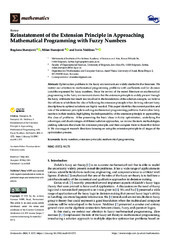Please use this identifier to cite or link to this item:
https://rfos.fon.bg.ac.rs/handle/123456789/2220Full metadata record
| DC Field | Value | Language |
|---|---|---|
| dc.creator | Stanojević, Bogdana | |
| dc.creator | Stanojević, Milan | |
| dc.creator | Nadaban, Sorin | |
| dc.date.accessioned | 2023-05-12T11:36:37Z | - |
| dc.date.available | 2023-05-12T11:36:37Z | - |
| dc.date.issued | 2021 | |
| dc.identifier.issn | 2227-7390 | |
| dc.identifier.uri | https://rfos.fon.bg.ac.rs/handle/123456789/2220 | - |
| dc.description.abstract | Optimization problems in the fuzzy environment are widely studied in the literature. We restrict our attention to mathematical programming problems with coefficients and/or decision variables expressed by fuzzy numbers. Since the review of the recent literature on mathematical programming in the fuzzy environment shows that the extension principle is widely present through the fuzzy arithmetic but much less involved in the foundations of the solution concepts, we believe that efforts to rehabilitate the idea of following the extension principle when deriving relevant fuzzy descriptions to optimal solutions are highly needed. This paper identifies the current position and role of the extension principle in solving mathematical programming problems that involve fuzzy numbers in their models, highlighting the indispensability of the extension principle in approaching this class of problems. After presenting the basic ideas in fuzzy optimization, underlying the advantages and disadvantages of different solution approaches, we review the main methodologies yielding solutions that elude the extension principle, and then compare them to those that follow it. We also suggest research directions focusing on using the extension principle in all stages of the optimization process. | en |
| dc.publisher | MDPI, Basel | |
| dc.relation | Serbian Ministry of Education, Science and Technological Development through Mathematical Institute of the Serbian Academy of Sciences and Arts | |
| dc.relation | Faculty of Organizational Sciences of the University of Belgrade | |
| dc.relation | info:eu-repo/grantAgreement/MESTD/inst-2020/200029/RS// | |
| dc.rights | openAccess | |
| dc.rights.uri | https://creativecommons.org/licenses/by/4.0/ | |
| dc.source | Mathematics | |
| dc.subject | mathematical programming | en |
| dc.subject | fuzzy numbers | en |
| dc.subject | extension principle | en |
| dc.title | Reinstatement of the Extension Principle in Approaching Mathematical Programming with Fuzzy Numbers | en |
| dc.type | article | |
| dc.rights.license | BY | |
| dc.citation.issue | 11 | |
| dc.citation.other | 9(11): - | |
| dc.citation.rank | aM21 | |
| dc.citation.volume | 9 | |
| dc.identifier.doi | 10.3390/math9111272 | |
| dc.identifier.fulltext | http://prototype2.rcub.bg.ac.rs/bitstream/id/778/2216.pdf | |
| dc.identifier.rcub | conv_2506 | |
| dc.identifier.scopus | 2-s2.0-85107994438 | |
| dc.identifier.wos | 000660253300001 | |
| dc.type.version | publishedVersion | |
| item.cerifentitytype | Publications | - |
| item.fulltext | With Fulltext | - |
| item.grantfulltext | open | - |
| item.openairecristype | http://purl.org/coar/resource_type/c_18cf | - |
| item.openairetype | article | - |
| Appears in Collections: | Radovi istraživača / Researchers’ publications | |
SCOPUSTM
Citations
11
checked on Nov 17, 2025
Page view(s)
16
checked on Dec 28, 2025
Download(s)
2
checked on Dec 28, 2025
Google ScholarTM
Check
Altmetric
This item is licensed under a Creative Commons License


